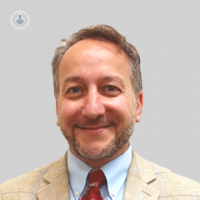Can snoring be stopped permanently?
Written by:Snoring can disrupt the quality of both you and your partner’s sleep, and may lead to daytime fatigue and irritability. Snoring is quite common, and occurs in approximately 25 to 50 per cent of middle-aged men. It is also very common in women, but about half as likely to occur.
In this article, Mr Ibrahim Srouji, renowned consultant ENT and facial plastic surgeon, explains how he treats snoring in his practice at The Mulberry Clinic in Huntingdon, and whether snoring can be stopped permanently.

What home remedies may help with snoring?
If possible, try to achieve a healthy weight. If you drink alcohol then think about the amount you consume, especially at night. If you have indigestion or heartburn despite cutting down on any alcohol, then seek treatment for this.
Sleeping on your side may be better than sleeping on your back. If you have a blocked nose or seasonal rhinitis (hay fever) that has not settled with antihistamine tables, over-the-counter steroid nasal spray or external nasal dilators, then book an appointment at the Mulberry Clinic or with a local specialist for further advice.
When does snoring need medical treatment?
Sometimes, snoring is a symptom of a more serious condition called obstructive sleep apnoea (OSA), but this is much less common and occurs in only one to four out of 100 people. If you are a snorer who also has very restless sleep, choking sensations, morning headaches, daytime sleepiness, poor memory or palpitations, then you should be tested for obstructive sleep apnoea and have treatment as soon as possible.
Most people who snore do not have obstructive sleep apnoea. This is classified as primary snoring (or simple snoring). If you suffer from this and it is affecting your physical functioning or relationships, you should also consider seeking treatment.
What are my treatment options?
Most snorers have more than one factor causing the problem. This normally includes two or more of the following: blocked nose, large tonsils, floppy palate, bulky tongue, receding jaw position, extra weight on the neck and general low muscle tone. Therefore, there are several treatment options available targeting each factor.
When you attend the appointment at The Mulberry Clinic, you will have a detailed assessment of all these areas and be given a recommendation of which treatment is more likely to help in your particular case. This can range from lifestyle changes, a dental device, or surgery to the nose, throat or tongue. A noticeable improvement can normally be expected with the chosen treatment, but the snoring does not always completely resolve in every case with just one treatment.
Can snoring be stopped permanently?
Yes, but this is not always guaranteed due to the multifactorial nature of snoring. In addition, a snorer’s general health and physiology can change over time, resulting in recurrent snoring unrelated to the initially treated cause. The good news, however, is that most people attending The Mulberry Clinic are able to achieve sufficient improvement of their symptoms as the correct treatment is chosen.
If snoring is affecting your day-to-day activities, do not hesitate to book an appointment with Mr Ibrahim Srouji via his Top Doctors profile for a consultation to discuss your options.


